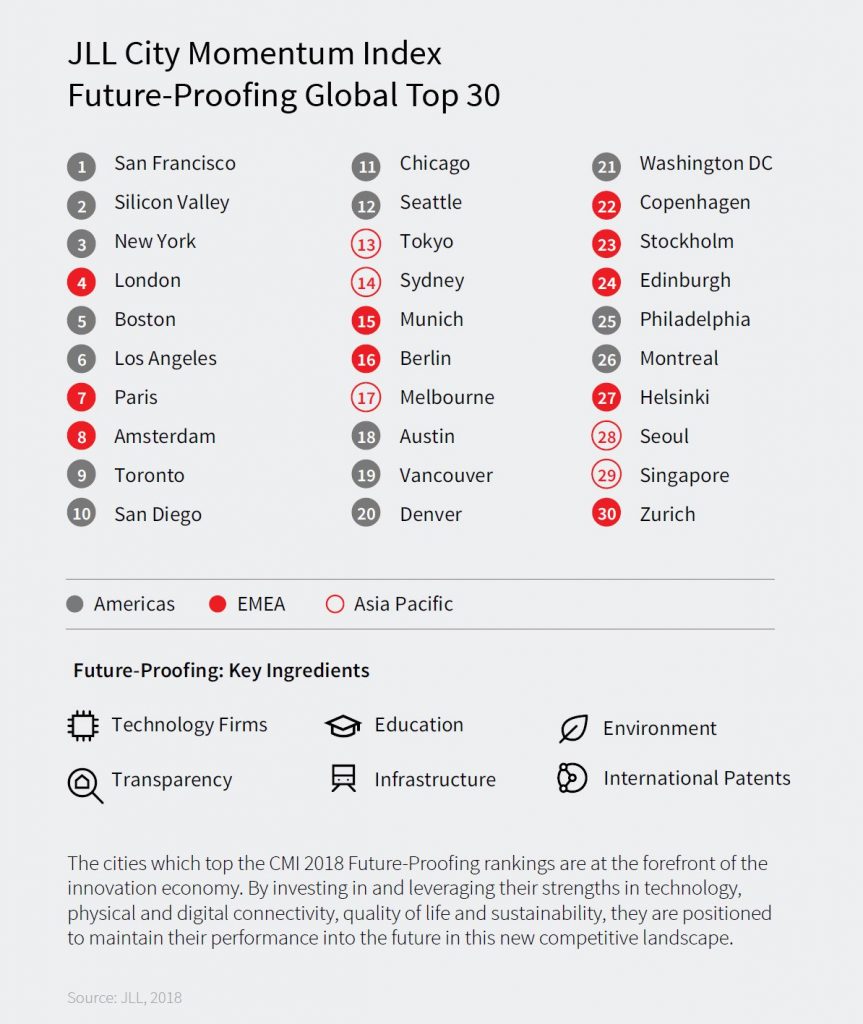As technology changes the way people live and work, cities are undergoing an unprecedented transformation. Those that have the infrastructure and strategy to manage this rapid technological shift are set to become the most competitive.
Globally, city economies in India, Vietnam and China have the strongest short-term momentum. The pace and scale of change in these markets is extraordinary, as they build out their skylines and infrastructure platforms to meet booming demand. While these changes present opportunities, many of these cities are facing challenges to their longer-term development prospects, with strains on infrastructure, high levels of inequality, issues around affordability, and environmental degradation.
Such rapid transformation is often eye-catching. But it is cities that are investing in a sustainable future, and laying the groundwork for ongoing success, that deserve recognition. These cities are “future-proofing” to ensure positive, long-term momentum.
Key elements of future-proofing include: the ability to drive and manage technological change; infrastructure that contributes to a high quality of life; a long-term city vision; and attracting and retaining talent.
The leading cities for future-proofing, as identified by JLL’s City Momentum Index, include major global hubs such as New York, London and Paris. But smaller centres that leverage their strengths in education, liveability and sustainability, such as Melbourne, Edinburgh and Montreal, are also future-proofing.
From our partners:
Technology is a driving force
In an increasingly digital economy, technological prowess is a key contributor to a city’s success. The jobs and businesses of the future will be created in cities that have an ecosystem to nurture innovative start-ups and scale-ups.
Some of the world’s most future-proof cities are also its strongest technology hubs. San Francisco, Silicon Valley, New York and London have some of the world’s highest concentrations of start-ups and “unicorns” (companies valued over $1 billion). And the next generation of technology centres is fast developing.
Toronto is highlighted for its world-leading ability to commercialize new technology and government support for initiatives, such as smart neighbourhood development Quayside. Amsterdam is home to one of Europe’s fastest-expanding technology scenes, underpinned by the city’s multilingual, highly educated workforce. It hosts the regional headquarters of several global technology companies and a high concentration of start-ups. Singapore’s robust education system and high levels of government spending on research have established it as a centre for high-tech innovation. It is also home to the regional headquarters of several world-leading technology companies.
Agility supports sustainable growth
The most future-proof cities are agile. They have the strategy and infrastructure to adapt to population growth while maintaining a high quality of life and continuing to attract businesses.
North Asia’s largest urban economies of Tokyo and Seoul are among the world’s most high-tech cities. They are investing in large-scale infrastructure projects, including Seoul’s Pangyo Techno Valley and Tokyo’s planned autonomous public transit system, to attract talent and enhance their residents’ quality of life.
Efficient public transport and strong digital infrastructure are key to the agility of many European cities, including Munich, Berlin, Copenhagen and Edinburgh. In Paris, investment into one of the world’s largest infrastructure projects, the Grand Paris cross-city, multi-mode transport network, is a significant contributor to its future momentum as one of the world’s leading megacities.
In Amsterdam and Berlin, strong social infrastructure that manages the affordability of real estate and the pace of development is emerging as a critical element. In cities such as London, Toronto, Sydney, Melbourne and Edinburgh, which have some of the world’s most transparent real estate markets, market openness plays an equally important role in securing future growth, by attracting global capital and business.
Talent a key factor
Developing, attracting and retaining skilled workers is crucial for future-proofing. Smaller cities such as Austin, Vancouver and Denver rely on strong education systems and well-developed public infrastructure that enhance the overall quality of life, helping to attract and retain talent. Sydney and Melbourne, which both support flourishing technology industries, are similarly well-poised for the future, bolstered by some of Australia’s most prestigious schools and universities. In the US, world-class universities in Boston, Los Angeles and San Diego help generate a highly educated workforce, while the quality of their research institutes makes these cities global leaders in science and technology.
The world’s cities, large and small, are set for continued growth. Future-proofing strategies are increasingly critical for accommodating the global boom in urban populations, as well as the ongoing technological change that is transforming how we live and work. While short-term momentum offers opportunities, it is the longer-term success of a city that is most important for businesses, investors and residents. Competitiveness and economic drive, underpinned by strong infrastructure, robust government policies and technological prowess, are key to preserving a city’s value and ensuring its future success.
This feature originally appeared in World Economic Forum.

















